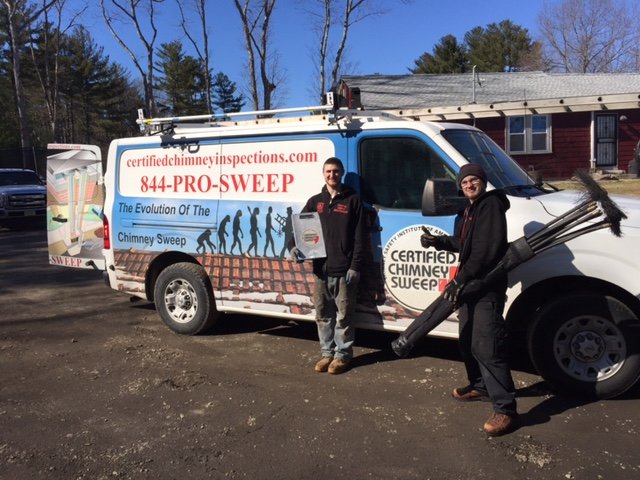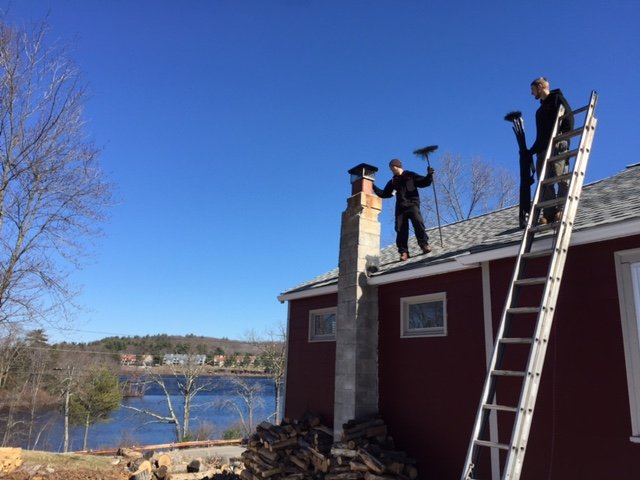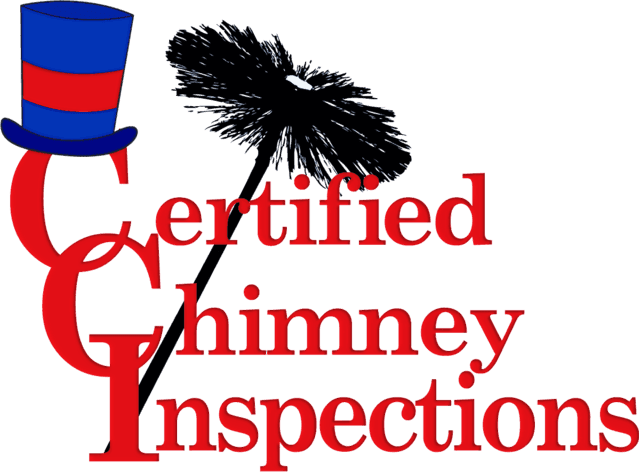Chimney Inspection New Hampshire
The Importance of Chimney Inspections in New Hampshire
Regularly scheduling chimney inspections in New Hampshire is important for several reasons.
We all know the northeastern part of the country can get cold and New Hampshire is no exception. Outdoor structures such as a chimney will be submitted to continual freezing and thawing throughout the New England seasons. Even if your chimney is new, a chimney inspection is a quick & affordable way of making sure your chimney is clean and in good working order.
Regular chimney inspections are vital for home safety, detecting issues like creosote buildup, cracks, blockages, or flue damage that can cause fires or release toxic gases into your home.
In New Hampshire, there are certain codes and regulations to adhere to. Regular inspections will make sure your chimney is still in compliance.
A well maintained chimney will naturally perform better. Regular inspections ensure your chimney is in good condition. This includes the liner, cap, damper, etc. Any malfunctioning components will hinder ventilation and heating.
Regular chimney inspections save money by identifying and resolving issues early. Minor problems can escalate, leading to costly repairs or replacements. Catching issues early avoids expenses and ensures chimney longevity.
Sometimes insurance companies require regular chimney inspections as a condition of coverage. They want to ensure that homeowners take the necessary steps to maintain the safety and integrity of their homes. Compliance with these requirements can prevent complications when filing claims related to chimney-related incidents.

In summary, regular chimney inspections in New Hampshire are essential for safety, compliance, efficient operation, cost savings, and possibly even insurance requirements.
By investing in routine inspections, you can maintain a safe and functional chimney system, ensuring peace of mind for your home and your family.
What's Different About Certified Chimney Inspections?
At Certified Chimney Inspections, we take pride in setting ourselves apart from the competition. While others may claim to provide professional level chimney services, we go above and beyond by offering a complimentary chimney inspection with every cleaning. Our team conducts a meticulous examination that detects any underlying issues, whether visible or hidden to the naked eye. Our comprehensive inspection not only evaluates the overall condition of your chimney but also determines the need for cleaning. And here’s the best part: if cleaning is required, we’ll subtract the inspection cost from the cleaning cost, giving you unparalleled value for your money. We challenge you to find another chimney sweep in New Hampshire that can match our unbeatable offer. Choose Certified Chimney Inspections for an exceptional level of service that goes beyond the ordinary.
Our Chimney Inspection Process
Here is a step-by-step explanation of a level 1 chimney inspection:
We assess the exterior of the chimney for any damage like cracks, loose bricks, or missing mortar. We also check for potential hazards such as overhanging branches or flammable materials nearby. Lastly, make sure the chimney is accessible and gather all the required equipment for a comprehensive inspection.
To ensure safety & cleanliness, our chimney inspectors wear proper PPE like gloves, safety goggles, and dust masks. Additionally, we set up safety barriers and caution signs to prevent accidental access to the work area and inform others about ongoing inspection activities.
We open the damper and use a flashlight to inspect the interior of the chimney. Looking for any visible signs of creosote buildup, which is a thick, tar-like substance on the chimney walls.
We examine the flue liner for any cracks, holes, or signs of deterioration. These issues can impact the structural integrity of the chimney and pose a fire hazard.
We’ll also be checking for any obstructions, such as debris or animal nests that may impede proper ventilation or be a fire threat. Removal of any blockages may be necessary for safe chimney operation.
We never forget to inspect the fireplace or stove connection to the chimney to ensure that it is secure and properly sealed. We don’t want to see any signs of smoke leakage or damage.
During the inspection we will document our findings and capture relevant photographs if required. If we have no news, that’s good news… otherwise, we’ll highlight the deficiencies, hazards, and necessary repairs your chimney requires. We’re here to help so our chimney techs will address any questions you have and provide guidance on chimney maintenance.

Remember that the specific steps may vary depending on the chimney type, local regulations, and the inspector’s expertise. It’s always recommended to consult a professional chimney inspector or a certified chimney sweep for accurate and thorough inspections.
The Levels of Chimney Inspections
There are three different levels of chimney inspections that are commonly recognized by professionals in the industry. These levels are referred to as levels I, II & III and are standardized by organizations such as the National Fire Protection Association (NFPA) and the Chimney Safety Institute of America (CSIA).
I. Level 1 Chimney Inspection
A Level 1 chimney inspection is the simplest and most common type. It's for well-maintained chimneys without major issues or major changes. The inspector checks accessible parts inside and outside to ensure structural integrity, no blockages, and compliance with codes
II. Level 2 Chimney Inspection
A Level 2 chimney inspection is more thorough than Level 1 and is recommended in specific situations. It is required when changes have been made to the chimney system, like if the fuel type has changed, new appliance installation, or after there has been damage from something such as a chimney fire or an earthquake. Level 2 inspections are also necessary during property sales or transfers. They involve specialized tools like video cameras to assess concealed areas like the flue liner and joints.
III. Level 3 Chimney Inspection
A Level 3 chimney inspection is the most extensive and invasive of all 3 levels. It's done when serious hazards are suspected, requiring access to concealed areas by removing components of the chimney or even parts of the building. Level 3 inspections are rare and typically follow Level 1 or Level 2 inspections that indicate a potentially bigger problem. They occur after chimney fires, severe weather events, or major structural changes or repairs.
Each level of inspection requires a different scope and varies depending on the chimney and its issues. You can trust a professional chimney organization like us. We know the quality of service we deliver and we don’t think you deserve anything less. So hire Certified Chimney Inspections to accurately assess your chimney system.
Frequently Asked Questions
How Much Does Chimney Inspection Cost in NH?
The price for a chimney inspection in New Hampshire from us is $99.95.
How Long Does A Chimney Inspection Take in NH?
A level 1 chimney inspection from our company will only take about 20 minutes to complete. A level 2 inspection may take around 40 minutes because of the equipment required.
How Often Should You Get Your Chimney Inspected?
It is recommended to get your chimney inspected at least once a year to ensure it’s safe to use.
